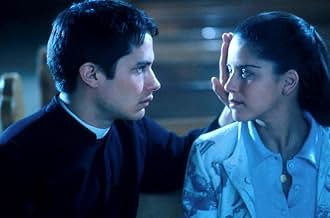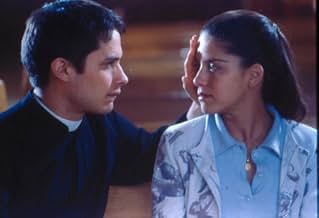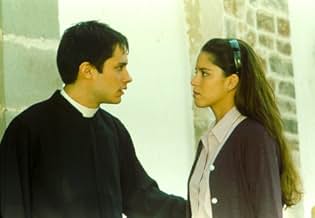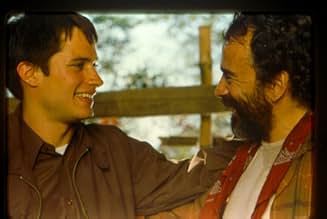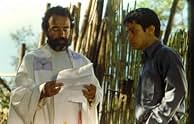IMDb RATING
6.7/10
15K
YOUR RATING
Politics and sexual passions threaten to corrupt a young, newly-ordained priest in a small Mexican town.Politics and sexual passions threaten to corrupt a young, newly-ordained priest in a small Mexican town.Politics and sexual passions threaten to corrupt a young, newly-ordained priest in a small Mexican town.
- Nominated for 1 Oscar
- 21 wins & 15 nominations total
Pedro Armendáriz Jr.
- Presidente Municipal Gordo
- (as Pedro Armendáriz)
- Director
- Writers
- All cast & crew
- Production, box office & more at IMDbPro
Storyline
Did you know
- TriviaThis movie began creating controversy even before it was released. Several groups, most of them related to the church, tried to ban it. They did not succeed; instead, tickets were sold out on opening weekend.
- GoofsAmaro gets beaten up by Ruben and receives some bruises in his face. A little later, when he meets Amelia in the church, the bruises are gone.
- Quotes
Father Amaro: Tell me your sins, child.
Amelia: You already know them. And your sins?
- Crazy credits"In memoriam Paco Rabal"
- ConnectionsFeatured in The 60th Annual Golden Globe Awards (2003)
Featured review
`El Crimen' was not a bad film, although it was hardly worthy of accolades. While the acting was passable, the story did not move along in a provocative enough manner to thoroughly captivate its audience-- in simple terms, the movie was somewhat slow.
What is interesting to notice is the reaction that the public-- especially the Catholic public-- has had to this film. As a Catholic, it saddens me to see the amazing amount of rage focused around the lust of the film's central character, Padre Amaro. The film, on a superficial level, was rebellion against stale relics of Catholic tradition-- such as requisite chastity for clergy and the deification of inanimate objects-- that may well spell the end of the faith if they are not shed. It is on these superficial levels that Padre Amaro is decried as a criminal of the faith by the viewing public, but lust is not this priest's true crime.
Central to the film's controversy is the corruption that propels the church. The truest crime of the film is the web of cover-ups and lies that the church creates in order to propagate its cause. The church is held deep in the pockets of the drug cartel and in order to maintain their stability, the majority of the church leadership, from the bishop down to the sacristans,
are quite comfortable with, at worst, lying and falsifying evidence or, at best, looking the other way. The crime of Padre Amaro is not so much that he acted upon his human impulses as that he accepts the corruption of the church by participating in its lies and creating lies of his own.
Unfortunately, this film's only exposé is not the corruption of the church, which has become more and more evident in recent times, but the faithful church body's willingness to pretend that none of this goes on. One of the most terrifyingly ironic cries of foul against this film, as evidenced in many of these reviews, is, `Priests would never act that way!' How can one, in today's climate, make such assertions? While this film should, in an ideal world, be objectionable, the current outcry by supposedly devout Catholics represents a denial of epidemic proportions.
If one would set aside one's group think for two hours while watching this film, one might gain a perspective of the church that our priests do not offer in their Sunday morning Masses. This film may not represent what we would like our church to be, but it does represent what our church is. If we continue to pretend that the current state of affairs of our faith is acceptable, then el crimen de Padre Amaro will also be our crime: complacence.
What is interesting to notice is the reaction that the public-- especially the Catholic public-- has had to this film. As a Catholic, it saddens me to see the amazing amount of rage focused around the lust of the film's central character, Padre Amaro. The film, on a superficial level, was rebellion against stale relics of Catholic tradition-- such as requisite chastity for clergy and the deification of inanimate objects-- that may well spell the end of the faith if they are not shed. It is on these superficial levels that Padre Amaro is decried as a criminal of the faith by the viewing public, but lust is not this priest's true crime.
Central to the film's controversy is the corruption that propels the church. The truest crime of the film is the web of cover-ups and lies that the church creates in order to propagate its cause. The church is held deep in the pockets of the drug cartel and in order to maintain their stability, the majority of the church leadership, from the bishop down to the sacristans,
are quite comfortable with, at worst, lying and falsifying evidence or, at best, looking the other way. The crime of Padre Amaro is not so much that he acted upon his human impulses as that he accepts the corruption of the church by participating in its lies and creating lies of his own.
Unfortunately, this film's only exposé is not the corruption of the church, which has become more and more evident in recent times, but the faithful church body's willingness to pretend that none of this goes on. One of the most terrifyingly ironic cries of foul against this film, as evidenced in many of these reviews, is, `Priests would never act that way!' How can one, in today's climate, make such assertions? While this film should, in an ideal world, be objectionable, the current outcry by supposedly devout Catholics represents a denial of epidemic proportions.
If one would set aside one's group think for two hours while watching this film, one might gain a perspective of the church that our priests do not offer in their Sunday morning Masses. This film may not represent what we would like our church to be, but it does represent what our church is. If we continue to pretend that the current state of affairs of our faith is acceptable, then el crimen de Padre Amaro will also be our crime: complacence.
- spacedogg1979
- Dec 7, 2002
- Permalink
- How long is The Crime of Padre Amaro?Powered by Alexa
Details
- Release date
- Countries of origin
- Official sites
- Language
- Also known as
- The Crime of Father Amaro
- Filming locations
- Production companies
- See more company credits at IMDbPro
Box office
- Budget
- $1,800,000 (estimated)
- Gross US & Canada
- $5,717,044
- Opening weekend US & Canada
- $504,681
- Nov 17, 2002
- Gross worldwide
- $26,996,738
- Runtime1 hour 58 minutes
- Color
- Sound mix
- Aspect ratio
- 1.85 : 1
Contribute to this page
Suggest an edit or add missing content








